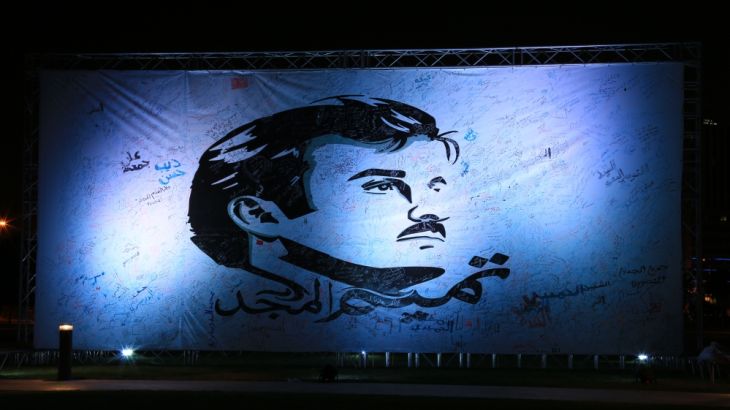
Qatar: Beyond the Blockade
A look at the effect of the GCC crisis and how it’s affecting life in Qatar – from family ties, to business, to art.
On June 5th, 2017, Saudi Arabia, the United Arab Emirates (UAE), Bahrain and Egypt imposed a blockade on Qatar – closing their land, air and sea borders with it – accusing it of funding “terrorism” and fomenting regional instability.
The Saudi, Emirati and Bahraini governments told their citizens to return from Qatar. They also asked Qatari citizens who were visiting, studying or living in their respective countries, to leave for Qatar within 14 days.
Keep reading
list of 4 itemsQatar emir condemns ‘genocide’ in Gaza, urges ceasefire at GCC summit
‘Enduring commitment’: Key takeaways from US-GCC joint statement
Analysis: Efforts to end Assad isolation gather speed after quake
This diplomatic move left Qatar partially isolated – economically, politically and culturally.
As this crisis continues without a solution, this film follows several people in Qatar to find out how they are facing up to life under blockade.
Lulwa al-Obaidli is a Qatari entrepreneur who has founded a number of different businesses.
![Lulwa Al Obaidli suffers twofold from the blockade as her potato snack business struggles to source basic ingredients and communication with family dispersed across the GCC is increasingly challenging [Showkat Shafi/Al Jazeera]](/wp-content/uploads/2018/02/85bbbcbf437943b0bc022d864eb251d6_18.jpeg)
Her potato-based snack business has suffered from the blockade, forcing her to downsize and look for new sources of potatoes and the customised flavourings. She has also felt the effect of the blockade on a personal level, with her siblings in the UAE seldom even communicating with her.
“It’s killing me that my brother is getting married and I can’t be there … Do you know how painful it is when you can’t even contact your own family?” says Lulwa. “I remember during Eid celebrations, [my brother] Abdulrahman only sent a text saying ‘Eid Mubarak’. Not even a phone call.”
Countries grow in crises, people grow in crises and we grew. Qatar has become stronger, Qatar has become more united.
Alanood, however, only has her father’s Bahraini citizenship. In all the GCC countries, citizenship is passed from father to child, so Alanood and her siblings are facing a dilemma: to leave their mother, university and home or potentially lose their only citizenship.
|
|
“All our memories, all our friends, all our family [are in Qatar],” says Alanood. “So to be forced to leave would be awful.”
Stories like these have inspired famous Qatari actor Ghanem al-Sulaiti to come out of a years’ long hiatus to write a series of satirical sketches mocking the absurdity of the blockade.
![Qatari actor and playwright Ghanem Al Sulaiti, centre, sees the blockade as an opportunity for Qatar to grow more self-reliant and for all its people, locals and expats alike, to unite [Showkat Shafi/Al Jazeera]](/wp-content/uploads/2018/02/b35a5bcd3e5d42e28404d58f7efa27df_18.jpeg)
“What’s Happening?” started as a series of sketches on YouTube and quickly became popular, gaining over two million hits – half of which are tracked to have come from audiences in the blockading countries.
He sees his political satire as a way to allow people to both laugh and lament at the Gulf diplomatic crisis. The film follows al-Sulaiti as he prepares for his recent play for a run at Qatar National Theatre on the same subject.
“My goals are simple. I want to restore our balance. To mock and laugh at what happened and to mourn what happened. But my biggest goal is to document this for future generations,” al-Sulaiti says.
![Roshan Bhattrai has been driving for Qatari Al Fadal Transport and Trading Company for years. He says that 95 percent of the transport fleet has been modified and retrained for new transport routes after the blockade was imposed [Showkat Shafi/Al Jazeera]](/wp-content/uploads/2018/02/70d91575a54b4e6cbdab693c53472313_18.jpeg)